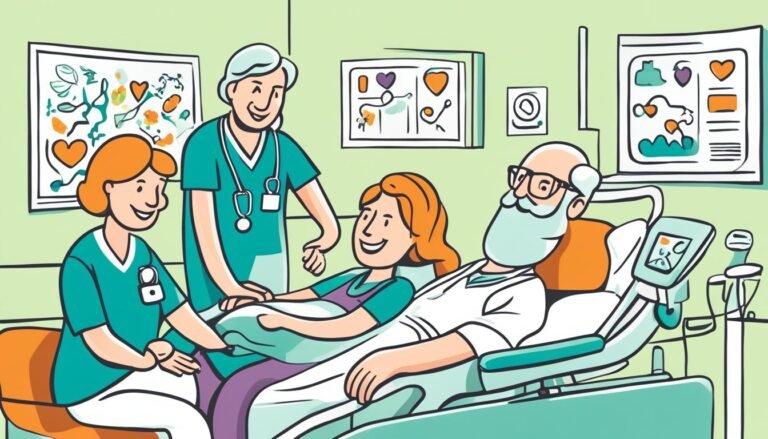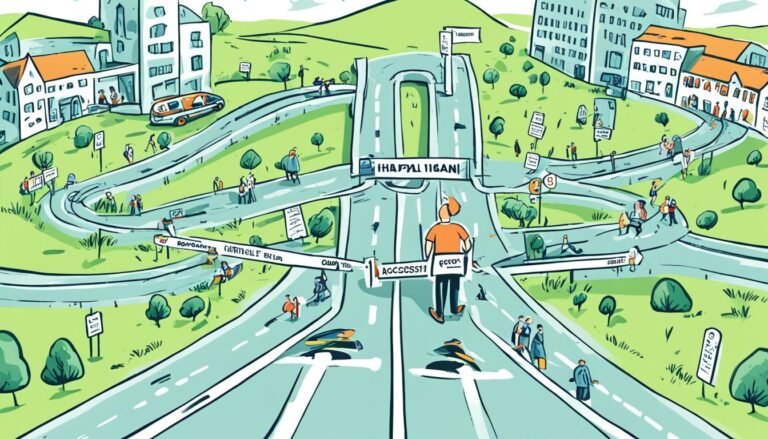The Future of Digital Health Records in Ireland
Ireland has the lowest digital health ranking among OECD countries. This fact shows how urgent it is for Ireland to start its digital health revolution. The move to electronic health records (EHRs) is a key step in improving healthcare.
By 2030, Ireland plans to change patient care and healthcare innovation with its Digital Health Framework. This change will make patient care better, make services more efficient, and keep patient data safe.
The framework will help patients take better care of themselves, get diagnosed early, and manage their health better. The Department of Health is also investing in new technologies and health infrastructure. This ensures Ireland’s healthcare system is ready for the 21st century.
Key Takeaways
- Ireland’s move to EHRs is a big step in changing healthcare.
- The Digital Health Framework 2024-2030 will boost innovation and focus on patients.
- Government plans focus on better patient care and keeping data safe.
- Investing in digital tech is key to using the European Health Data Space fully.
- Goals include digitizing patient records, promoting self-care, and improving healthcare quality and efficiency.
Introduction to Ireland’s Digital Health Framework
The Department of Health in Ireland launched the ‘Digital for Care: A Digital Health Framework for Ireland 2024-2030.’ This plan shows Ireland’s dedication to improving healthcare through digital tools. It aims to make care affordable, fair, and safe for everyone.
Overview of the Digital for Care Framework (2024-2030)
The Digital for Care Framework is all about using digital tech to change healthcare for the better. It focuses on empowering patients, having a skilled digital workforce, and creating a seamless care system. The plan also includes using data to make better decisions and building a strong digital health community.
It’s about giving patients more control over their health, making healthcare more efficient, and making sure everyone has access to their health data. The goal is to use resources wisely and make Ireland a leader in digital health.
Government Commitment and Funding
The Irish government is fully behind this digital health push, with more money for new tech and data analysis. This will help make healthcare better and more efficient. AI and robotic process automation will be key in reaching these goals.
Minister for Health Stephen Donnelly sees digitizing health and social care as crucial. The HSE has a roadmap for digital health from 2024 to 2030. It outlines how digital will change healthcare in Ireland, including new apps, remote care, and digital therapies.
With a strong IT setup and top-notch cybersecurity, Ireland is ready to see big improvements in healthcare. This will help both big and small companies, and encourage new digital health ideas.
The Role of Electronic Medical Records (EMRs)
Electronic Medical Records (EMRs) are key to changing healthcare in Ireland. About 99% of general practitioners (GPs) in the Netherlands use Electronic Health Records (EHRs). This shows how EMRs beat old paper systems.
Benefits of EMRs Over Paper-Based Records
Using EMRs for digital record-keeping has many perks:
- Enhanced Data Accuracy: EMRs cut down on errors from manual data entry.
- Improved Clinical Outcomes: They give doctors easy access to a patient’s full history, helping them make better decisions.
- Efficient Healthcare Delivery: They make workflows smoother and patient data quicker to get, which helps care quality.
- Data Sharing: EMRs make it easier for healthcare providers to share information, leading to better care coordination.
In Ireland, most GPs use electronic patient records with advanced systems. The new National Children’s Hospital and the National Rehabilitation Hospital are using electronic records too. This shows Ireland’s push for better healthcare.
Implementation Challenges
Even with big benefits, putting in EMRs has its hurdles:
- System Integration: Merging different record systems into one digital setup is hard and takes a lot of work.
- Training Healthcare Staff: Teaching staff about new tech takes a lot of time and effort.
- Change Management: Overcoming doubts and resistance to change is key for a smooth switch to EMRs.
- Financial Investment: The 2022 National Service Plan put €333 million towards ICT and eHealth, with €15 million for EHR projects. This shows the big money needed.
Prof Martin Curley says 85% of Irish hospital records are still on paper. This shows we need to move faster to EMRs to match healthcare’s digital growth.
Patient Data Security in Digital Health Records
Digital health records are now common, making patient data security crucial. Ireland is committed to keeping data safe with strong security rules. After the 2021 HSE cyberattack, having good security is more important than ever.
Measures to Enhance Cyber Resilience
The Irish healthcare system is getting better at fighting cyber threats. They use several strategies to stay safe:
- Regular Security Audits: They check their systems often to find and fix weak spots.
- Advanced Encryption Techniques: They use strong encryption to keep patient data safe from hackers.
- Employee Training Programs: All healthcare workers learn how to protect data and stay updated on threats.
- Incident Response Plans: They have plans ready to quickly handle any security issues.
These steps help build a strong culture that values keeping patient data private.
Data Protection Laws and Regulations
Following data protection laws is key to keeping patient data safe. Ireland’s Data Protection Act 2018, like GDPR, has strict rules for protecting patient info. This law makes sure:
- Strict Data Handling Protocols: Patient data is handled in a fair and open way.
- Consent Management: Patients must agree before their data is used or shared.
- Data Minimization: Only the needed data is collected for healthcare.
- Patient Rights: Patients can see, change, and manage their health records.
Following these rules helps keep patient data private. This gives patients trust that their info is safe.
Advancements in Telehealth Services
Ireland’s digital health roadmap sees telehealth as key to changing healthcare. It aims to grow telehealth to improve healthcare systems. Telehealth uses technology to give healthcare services over distance. This includes things like diagnosis, treatment, and education through online meetings.
Telehealth makes healthcare more accessible and efficient. It cuts down on travel costs and time away from home. This way, older people can get care from home easily.
During the COVID-19 pandemic, many older people in Ireland used telehealth. They got care from GPs, pharmacists, and hospital doctors online. Telehealth also offered online support and therapy for patients and caregivers.
Telehealth lets doctors monitor patients’ health online. They can track vital signs and symptoms in real-time. This helps catch diseases early and treat them faster.
But, there are still hurdles to overcome in telehealth. Problems like internet access, knowing how to use technology, and keeping data safe are big ones. Ireland is working on these issues for better telehealth services.
The “Better Together for Digital Healthcare” conference on December 1st, 2023, talked about telehealth’s benefits. It showed how it cuts down on travel and costs. The event focused on making telehealth work better for everyone.
Ireland’s Digital Health Framework for 2024-2030 plans to change healthcare with telehealth. It aims to empower patients and healthcare workers with technology. This will lead to a better and lasting healthcare system.
The Influence of AI in Healthcare
AI is changing healthcare in Ireland with new solutions and better patient care. AI systems help with making decisions and doing routine tasks. This lets doctors focus more on caring for patients.
AI in Clinical Decision Support
AI tools help doctors make quick decisions and treat patients better. They look at lots of health data to make diagnoses more accurate. AI can also predict when patients might get worse and suggest treatments.
This makes health outcomes better. Many people think AI will be a big part of healthcare soon. It shows how important AI is becoming.
Robotic Process Automation (RPA) in Routine Tasks
Robotic Process Automation (RPA) is another big thing in healthcare AI. It does tasks like booking appointments and managing patient data. This frees up doctors to spend more time with patients.
As RPA grows, it’s making healthcare work better. It’s a big step forward in making things more efficient.
AI is opening up new ways to improve healthcare in Ireland. By using AI for making decisions and automating tasks, healthcare can be more efficient and focused on patients. This helps both patients and doctors.
Blockchain Technology in Healthcare
Blockchain technology is changing healthcare in Ireland for the better. It aims to make secure health transactions, improve EHR interoperability, and keep medical records integrity high. These goals are key for a system that wants to be open and efficient.
Blockchain keeps a secure, unchangeable record of health information. This means medical records stay safe and can’t be altered. It’s crucial for protecting patient data and keeping it private.
Blockchain can also solve problems with sharing electronic health records (EHRs). It lets different healthcare providers easily share patient info. This improves care and cuts down on paperwork. Experts say over 70% of healthcare leaders think blockchain will make clinical trials and managing medical records better.
Blockchain makes sharing sensitive health info safe and quick. It stops fake drugs by tracking where they come from. This ensures drugs are real and safe to use.
In Ireland, the government is backing blockchain in healthcare with funding for eHealth projects. After a big data leak in 2017, showing the need for strong security, blockchain looks like a solid choice. It stores data safely and securely, unlike centralized systems.
Healthcare worldwide struggles with poor data sharing, costing billions each year. Blockchain offers a solution by making data secure and reliable. Ireland can lead in digital health with blockchain.
The Integration of Wearable Health Devices
Wearable health technology is becoming a key part of healthcare in Ireland. These devices help manage chronic conditions and improve personalized care. They can greatly help Ireland’s digital health framework.
Role of Wearables in Monitoring Chronic Conditions
Wearable health technology is vital for managing chronic conditions. These devices track health metrics like VO2 max and blood pressure. This data helps doctors act quickly.
Even though most people in Ireland are okay with sharing health data with doctors, the healthcare system isn’t ready yet. Using wearable devices for remote patient monitoring can cut down on hospital visits. This could ease the burden on Ireland’s healthcare system, especially for chronic diseases.
Future Prospects of Wearable Technology
The future of wearable devices in healthcare looks bright. They’re expected to grow to a $195.57 billion market by 2027. These devices will be key in making healthcare more personal.
When combined with AI, wearable technology can change how we manage chronic conditions. For instance, Philip’s biosensor has shown to reduce serious health issues. This shows how wearable devices can improve patient care and help doctors.
Integrating wearable health technology in Ireland means tackling tech, infrastructure, and governance issues. Yet, the benefits for improving services and patient care make it a crucial step for Ireland’s digital health future.
Remote Patient Monitoring and Its Benefits
Remote patient monitoring (RPM) changes how healthcare is given by letting doctors check on patients from afar. This way, doctors can spot health problems early and stop them from getting worse. It helps patients get better faster.
RPM makes patients more involved in their health care. They learn more about their health and how they can improve it. This leads to better health and can cut hospital visits by up to 40%, saving money too.
In Ireland, telemedicine hubs are making it easier for patients to get doctor visits online, no matter where they are. These hubs use RPM to connect patients with doctors, making sure everyone gets the care they need.
To make the most of RPM, we need to make sure everyone has internet and can afford devices. Training doctors to use these new tools is also key. This way, patients in remote areas can use RPM too, and doctors can give great care online.
Keeping patient data safe is also crucial. We need strong rules to protect medical info and respect patient privacy. This keeps trust in online health services strong.
In short, RPM has big benefits like better patient care and saving money. By fixing issues like internet access and keeping data safe, RPM can change patient care for the better. It leads to healthier patients and saves the healthcare system money.
Cloud-Based Health Systems: A New Era
Cloud-based health systems are leading the way in Ireland’s digital healthcare. They make moving to a digital healthcare world easier. The market for cloud-based electronic health records (EHRs) is expected to hit $38.7 billion by 2030. This shows how fast this technology is being taken up.
Advantages of Cloud Computing in Healthcare
Healthcare cloud computing brings many benefits, like being able to grow and save money on storage. Cloud solutions let healthcare groups keep lots of data without needing expensive hardware. This saves money and lets them spend on important areas like IT and patient care.
Cloud EHRs are also more secure than old paper systems. They use encrypted data and strict checks to keep information safe. This greatly lowers the chance of data theft and privacy issues. If there’s a cyberattack or disaster, data can be quickly recovered, keeping patient care going.
Interoperability with Existing Systems
Cloud health solutions make it easy for different systems to work together. This creates a smooth and efficient healthcare setup. It helps share data between healthcare providers, leading to better care for patients.
Cloud systems also make it easier for patients to get into their health records and talk with doctors. This makes patients more involved in their health care. It gives them the power to manage their health better.
Countries should move from old paper systems to digital and cloud-based ones. Ireland is one of the least ready countries for EHR systems, but there’s a lot of room to grow. Using cloud health solutions can lead to a more proactive, personalized, and predictive healthcare model. This could change healthcare in Ireland and other countries for the better.
Steps Towards the Future of Digital Health Records in Ireland
Ireland is moving forward with a strong plan for digital health innovation. They’re using a phased EHR implementation to bring in new tech step by step. This approach aims to make healthcare better for everyone.
Phased Roll-Out of Electronic Health Records (EHR)
The “Digital for Care” framework outlines a detailed plan for EHR. First, they’re focusing on patient-centric apps. These apps let people see their health records and update them easily.
Next, they’ll create a ‘Shared Care Record’ system. This will make sure health records can be shared easily among different doctors and hospitals.
Patient-Centered App for Record Input
At the heart of this plan are patient-centric apps. These apps make it easier for patients to manage their health data. They help patients take a bigger role in their healthcare.
These apps are part of a bigger plan. It includes using more telehealth, automating tasks, and sending reminders. All these steps aim to make healthcare more efficient and focused on the patient.
Conclusion
Ireland is on a path to change healthcare with digital health evolution. This change is making healthcare better. With over 350,000 mobile health apps and 5 million downloads every day, patients are taking charge of their health.
Germany, France, and Belgium are leading the way with their digital health systems. Ireland can learn from them to make healthcare better. The DiGA model lets patients use health apps without extra costs, with a doctor’s note or health insurance.
Austria and Finland might follow the DiGA framework soon. Ireland can lead in healthcare trends by solving digitalization challenges. Studies show digital health improves healthcare, making it better for staff and patients. By adopting these changes, Ireland will bring in a new era of patient-centered, tech-savvy healthcare.
Source Links
- Ireland gets new platform to embrace electronic health records
- Ireland sets out roadmap in Digital Health Framework for 2024 – 2030 – htn
- Summary of the Digital Health Framework for Ireland 2024-2030
- Digital for Care: Ireland’s national digital health strategy released – Pulse+IT
- Digital for Care
- Would it work here: Could Ireland bring in a national electronic healthcare record for everyone?
- Delay in rolling out electronic health records an ‘enormous missed opportunity’
- What is an Electronic Health Record (EHR)?
- European Health Data Space will enable health innovation through secure data sharing | Amazon Web Services
- Draft legislation envisages Ireland’s first electronic health information system
- Patients and service users to benefit from new HSE Telehealth Plan – HSE.ie
- Summary of the Digital Health Framework for Ireland 2024-2030
- How public readiness can drive digital health transformation
- Innovative Digital Health Technologies in UK & Ireland | HCI
- How AI drove efficiency in Irish healthcare: Lessons for the NHS
- The Potential of Blockchain Technology for Health Information Exchange: Experimental Study From Patients’ Perspectives
- A systematic study on integrating blockchain in healthcare for electronic health record management and tracking medical supplies
- A bright future for Ireland’s digital health ecosystem – Enterprise Ireland – Global Ambition
- How wearable devices can help Ireland get into better shape
- No title found
- Perceived factors informing the pre-acceptability of digital health innovation by aging respiratory patients: a case study from the Republic of Ireland
- Bridging the Gap: How Virtual Consultations and Remote Patient Monitoring are Improving Healthcare Access
- Why Remote Patient Monitoring is the Future of Healthcare Industry?
- 5 Benefits of Moving Electronic Health Records to the Cloud
- Developments In Healthcare Information Systems in Ireland and Internationally
- Government launches long-awaited digital health plan
- EIT-Whitepaper
- Digital Transformation in Healthcare: Technology Acceptance and Its Applications








